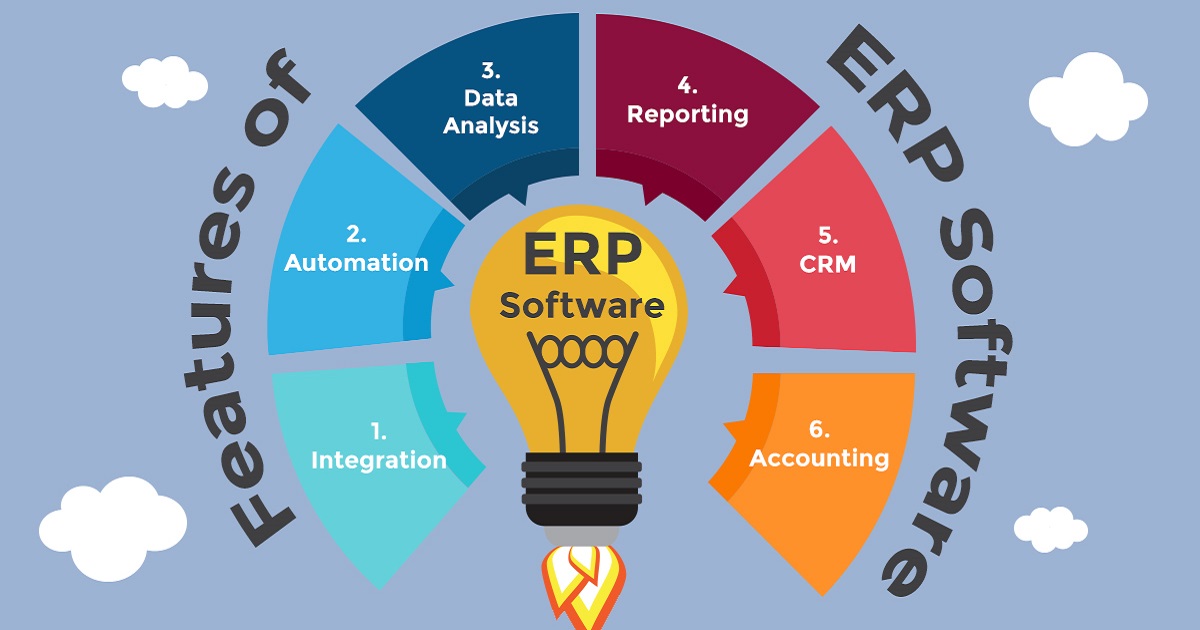In today’s competitive business environment, organizations of all sizes are turning to Enterprise Resource Planning (ERP) solutions to streamline their operations, enhance productivity, and boost overall efficiency. ERP systems are designed to integrate various business processes such as finance, HR, inventory management, supply chain, and more, into one unified platform. In this blog, we’ll explore the benefits, features, and key considerations for implementing ERP in your organization.
What is Enterprise Resource Planning (ERP)?
Enterprise Resource Planning (ERP) is a type of software that helps organizations manage day-to-day activities across multiple departments in a unified system. By centralizing data, ERP solutions ensure that all business functions operate cohesively, offering real-time insights, automation, and improved decision-making.
Key Benefits of ERP Systems
- Improved Efficiency and Productivity ERP systems automate manual processes such as payroll, order processing, and inventory tracking, freeing up employees to focus on higher-value tasks. This leads to improved productivity and reduced errors.
- Centralized Data and Real-Time Insights ERP provides a centralized database that integrates data from all departments. This ensures accurate and real-time data visibility, allowing businesses to make more informed decisions.
- Enhanced Collaboration With ERP, all departments have access to the same data, promoting collaboration across teams. Whether it’s finance, HR, or inventory management, ERP ensures smooth communication.
- Better Financial Management ERP systems offer integrated financial tools for budgeting, forecasting, and accounting. Businesses can track financial performance in real-time, ensuring better financial control.
- Inventory and Supply Chain Optimization ERP systems are equipped with tools for monitoring inventory levels, managing procurement, and optimizing the supply chain. This helps businesses reduce costs, avoid stockouts, and ensure timely deliveries.
- Scalability ERP systems are scalable, allowing businesses to grow without being restricted by outdated processes or technology. As your business expands, your ERP system can accommodate additional users, processes, and data.
Key Features of ERP Software
- Financial Management ERP systems integrate accounting, budgeting, and financial reporting functionalities. This simplifies financial management and ensures accuracy in financial operations.
- Human Resource Management ERP platforms often come with modules for tracking employee data, payroll, attendance, and performance. This helps streamline HR processes and ensures compliance with labor regulations.
- Supply Chain Management ERP systems help businesses track and manage their entire supply chain, from procurement to delivery. This leads to better inventory management and more efficient supply chain operations.
- Customer Relationship Management (CRM) Many ERP systems offer integrated CRM tools to manage customer interactions, sales, and customer service. This helps improve customer satisfaction and drive sales growth.
- Reporting and Analytics ERP systems provide comprehensive reporting and analytics tools, offering insights into performance, customer behavior, and operations. Businesses can use this data to drive strategic decisions.
How to Choose the Right ERP System
When choosing an ERP system, consider the following:
- Business Needs: Assess your business requirements, processes, and goals to choose an ERP that meets your specific needs.
- Customization and Flexibility: Look for an ERP system that can be customized to fit your business and scale as you grow.
- User-Friendliness: The ERP software should be easy to use and accessible to all employees, regardless of technical expertise.
- Vendor Support: Ensure that the vendor offers continuous support, including training and system updates.
- Cost: Consider the total cost of ownership, including implementation, maintenance, and licensing fees.
Conclusion
Enterprise Resource Planning (ERP) is a vital tool for businesses looking to streamline operations, reduce costs, and improve decision-making. By implementing the right ERP solution, companies can boost productivity, improve collaboration, and drive long-term growth. ERP systems offer scalability and flexibility, making them suitable for businesses of all sizes and industries.
Frequently Asked Questions (FAQs)
1. What is the primary function of an ERP system?
An ERP system integrates various business functions into a unified platform, improving efficiency, decision-making, and collaboration across departments.
2. Can ERP systems be customized for different industries?
Yes, ERP systems are highly customizable and can be tailored to meet the specific needs of various industries, including manufacturing, retail, healthcare, and more.
3. How long does ERP implementation take?
The time required to implement an ERP system depends on the size and complexity of the organization. It can take anywhere from several months to over a year for full implementation.
4. Do ERP systems help with compliance?
Yes, ERP systems assist businesses in staying compliant with industry standards and regulations by automating compliance-related processes and documentation.
5. What are the costs associated with ERP systems? ERP systems typically involve setup costs, licensing fees, and ongoing maintenance fees. The overall cost varies depending on the features and level of customization required.
Pigeon Polypropylene Mini Handy and Compact Chopper with 3 Blades for Effortlessly Chopping Vegetables and Fruits for Your Kitchen (12420, Green, 400 ml)
₹199.00 (as of 19 September, 2024 18:22 GMT +05:30 - More infoProduct prices and availability are accurate as of the date/time indicated and are subject to change. Any price and availability information displayed on [relevant Amazon Site(s), as applicable] at the time of purchase will apply to the purchase of this product.)Alarm clock, digital clock, table clock for Students, watch timer for study, Home, Office, Bedroom, kitchen, loud desk alarm clocks for heavy sleepers with Automatic Sensor, Time, Date & Temperature
₹379.00 (as of 19 September, 2024 18:09 GMT +05:30 - More infoProduct prices and availability are accurate as of the date/time indicated and are subject to change. Any price and availability information displayed on [relevant Amazon Site(s), as applicable] at the time of purchase will apply to the purchase of this product.)CareFoam Ultimate Cervical Neck Pillow for Pain Relief Sleep, Improves Posture & Spinal Alignment, Neck Pain Relief Cushion with Ultra Responsive Memory Foam & Skin Friendly Cover, White Pack of 1
₹698.00 (as of 19 September, 2024 18:09 GMT +05:30 - More infoProduct prices and availability are accurate as of the date/time indicated and are subject to change. Any price and availability information displayed on [relevant Amazon Site(s), as applicable] at the time of purchase will apply to the purchase of this product.)Homestrap Set of 6 Non-Woven Printed Saree Cover/Cloth Storage/Wardrobe Organizer For Clothes with Transparent Window (Grey)(Shark Tank Featured)
₹369.00 (as of 19 September, 2024 18:22 GMT +05:30 - More infoProduct prices and availability are accurate as of the date/time indicated and are subject to change. Any price and availability information displayed on [relevant Amazon Site(s), as applicable] at the time of purchase will apply to the purchase of this product.)SHAYONAM Pack Of 2 Black Gas Saver Burner Stand Gas Chula Burner Gas Saver Stand Jali Ring Fire & Windproof Energy Saving, Gas Chula Support Stand 4 Legs Supported For Indian Gas 0.7mm/*-
₹499.00 (as of 19 September, 2024 18:09 GMT +05:30 - More infoProduct prices and availability are accurate as of the date/time indicated and are subject to change. Any price and availability information displayed on [relevant Amazon Site(s), as applicable] at the time of purchase will apply to the purchase of this product.)Discover more from The General Post
Subscribe to get the latest posts sent to your email.





